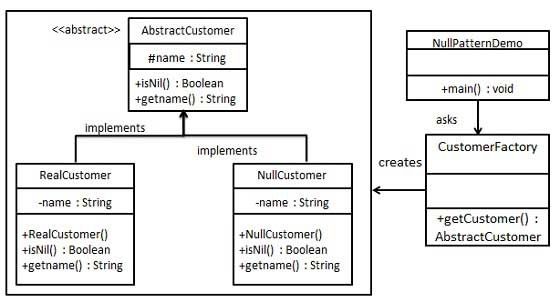
Creational Design Patterns
- Design Patterns - Factory Pattern
- Abstract Factory Pattern
- Design Patterns - Singleton Pattern
- Design Patterns - Builder Pattern
- Design Patterns - Prototype Pattern
Structural Design Patterns
- Design Patterns - Adapter Pattern
- Design Patterns - Bridge Pattern
- Design Patterns - Filter Pattern
- Design Patterns - Composite Pattern
- Design Patterns - Decorator Pattern
- Design Patterns - Facade Pattern
- Design Patterns - Flyweight Pattern
- Design Patterns - Proxy Pattern
- Chain of Responsibility Pattern
Behavioral Design Patterns
- Design Patterns - Command Pattern
- Design Patterns - Interpreter Pattern
- Design Patterns - Iterator Pattern
- Design Patterns - Mediator Pattern
- Design Patterns - Memento Pattern
- Design Patterns - Observer Pattern
- Design Patterns - State Pattern
- Design Patterns - Strategy Pattern
- Design Patterns - Template Pattern
- Design Patterns - Visitor Pattern
J2EE Design Patterns
- Design Patterns - Null Object Pattern
- Design Patterns - MVC Pattern
- Business Delegate Pattern
- Composite Entity Pattern
- Data Access Object Pattern
- Front Controller Pattern
- Intercepting Filter Pattern
- Service Locator Pattern
- Transfer Object Pattern
Design Patterns Useful Resources
Design Patterns - Null Object Pattern
In Null Object pattern, a null object replaces check of NULL object instance. Instead of putting if check for a null value, Null Object reflects a do nothing relationship. Such Null object can also be used to provide default behaviour in case data is not available.
In Null Object pattern, we create an abstract class specifying various operations to be done, concrete classes extending this class and a null object class providing do nothing implemention of this class and will be used seemlessly where we need to check null value.
Implementation
We are going to create a AbstractCustomer abstract class defining opearations. Here the name of the customer and concrete classes extending the AbstractCustomer class. A factory class CustomerFactory is created to return either RealCustomer or NullCustomer objects based on the name of customer passed to it.
NullPatternDemo, our demo class, will use CustomerFactory to demonstrate the use of Null Object pattern.

Step 1
Create an abstract class.
AbstractCustomer.java
package com.tutorialspoint;
public abstract class AbstractCustomer {
protected String name;
public abstract boolean isNil();
public abstract String getName();
}
Step 2
Create concrete classes extending the above class.
RealCustomer.java
package com.tutorialspoint;
public class RealCustomer extends AbstractCustomer {
public RealCustomer(String name) {
this.name = name;
}
@Override
public String getName() {
return name;
}
@Override
public boolean isNil() {
return false;
}
}
NullCustomer.java
package com.tutorialspoint;
public class NullCustomer extends AbstractCustomer {
@Override
public String getName() {
return "Not Available in Customer Database";
}
@Override
public boolean isNil() {
return true;
}
}
Step 3
Create CustomerFactory Class.
CustomerFactory.java
package com.tutorialspoint;
public class CustomerFactory {
public static final String[] names = {"Rob", "Joe", "Julie"};
public static AbstractCustomer getCustomer(String name){
for (int i = 0; i < names.length; i++) {
if (names[i].equalsIgnoreCase(name)){
return new RealCustomer(name);
}
}
return new NullCustomer();
}
}
Example - Usage of Null Object Pattern
Use the CustomerFactory to get either RealCustomer or NullCustomer objects based on the name of customer passed to it.
NullPatternDemo.java
package com.tutorialspoint;
public class NullPatternDemo {
public static void main(String[] args) {
AbstractCustomer customer1 = CustomerFactory.getCustomer("Rob");
AbstractCustomer customer2 = CustomerFactory.getCustomer("Bob");
AbstractCustomer customer3 = CustomerFactory.getCustomer("Julie");
AbstractCustomer customer4 = CustomerFactory.getCustomer("Laura");
System.out.println("Customers");
System.out.println(customer1.getName());
System.out.println(customer2.getName());
System.out.println(customer3.getName());
System.out.println(customer4.getName());
}
}
abstract class AbstractCustomer {
protected String name;
public abstract boolean isNil();
public abstract String getName();
}
class RealCustomer extends AbstractCustomer {
public RealCustomer(String name) {
this.name = name;
}
@Override
public String getName() {
return name;
}
@Override
public boolean isNil() {
return false;
}
}
class NullCustomer extends AbstractCustomer {
@Override
public String getName() {
return "Not Available in Customer Database";
}
@Override
public boolean isNil() {
return true;
}
}
class CustomerFactory {
public static final String[] names = {"Rob", "Joe", "Julie"};
public static AbstractCustomer getCustomer(String name){
for (int i = 0; i < names.length; i++) {
if (names[i].equalsIgnoreCase(name)){
return new RealCustomer(name);
}
}
return new NullCustomer();
}
}
Output
Verify the output.
Customers Rob Not Available in Customer Database Julie Not Available in Customer Database